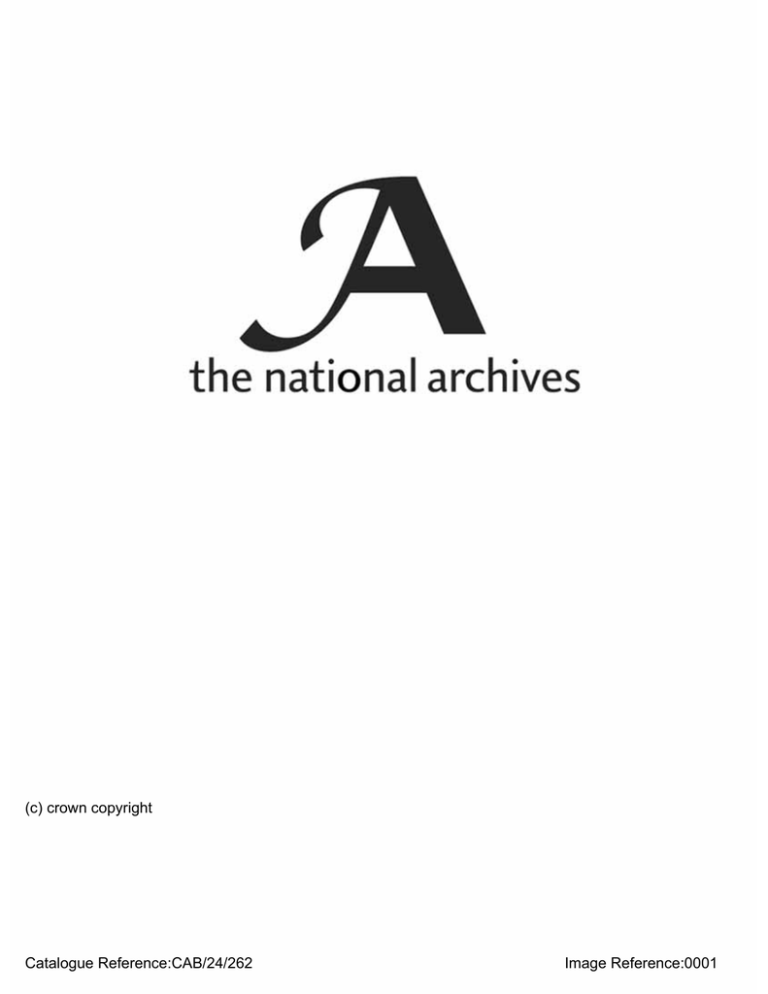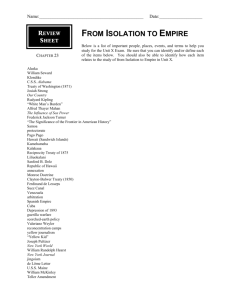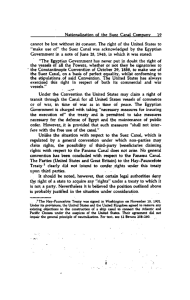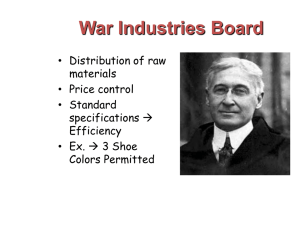(c) crown copyright Catalogue Reference:CAB/24/262 Image Reference:0001
advertisement

(c) crown copyright Catalogue Reference:CAB/24/262 Image Reference:0001 THIS DOCUMENT I S THE PROPERTY OF HIS BRITANNIC MAJESTY S T S E C R E T . Co P. 115 GOVERMO^T). COPY NO. Q- I (56). G A B I N E T. . THE ANGLO-EGYPTIAN I circulate TREATY. am d i r e c t e d b y t h e to the Cabinet the and C o n c l u s i o n s of Egyptian negotiations Treaty in the Committee 27th A p r i l , of Prime M i n i s t e r attached a discussion Imperial on t h e Defence place on M o n d a y , 1936. M.P A Secretary Gardens, 28th A p r i l , Minutes Anglo- which took (Signed) 2, Whitehall Draft to 1936. "l., A 0 HANKSY, to the Cabinet. THIS DOCUMENT IS THE PROPERTY OF HIS BRITANNIC MAJESTVS GOVERNMENT Printed for the Committee of Imperial Defence. April 1936. SECRET. Copy N o . COMMITTEE Extract from the DRAFT OF I M P E R I A L DEFENCE. Minutes of the 277th Meeting, (1)—ANGLO-EGYPTIAN held on April 27, 1936. TREATY. (C.I.D. Papers Nos. 1225-B, 1228-B, 1229-B and 1232-B.) (Previous reference : C.I.D. Minutes of 276th Meeting, Minute 3.) T H E C O M M I T T E E had under consideration the following papers :— Military Aspects— Report by the Chiefs of Staff Sub-Committee. (C.I.D. Paper No. 1225-B—la-k^ad^ei^yaigd^s^ Letter from the Foreign Office. (C.I.D. Paper No. 1 2 2 9 - B - a ^ m s ^ ^ e e ^ s m ^ f Inclusion of a Time Limit— Report by Chiefs of Staff Sub-Committee. (C.I.D. Paper No. 1 2 2 8 - B - - ^ e a ^ ^ P e t s i a * e * ^ i Review of Present Position— Memorandum by the Foreign Office. (C.I.D. Paper No. 1 2 3 2 - B - ^ f e ^ b ^ f e ^ t e t e ^ ) T H E P R I M E M I N I S T E R welcomed the representatives of the Dominions Governments whose views on this problem were of vital importance. A t the Prime Minister's request, M R . E D E N summarised the points at issue. (i) Originally Sir Miles Lampson had been authorised to negotiate in three stages, A , B and C. I t was for consideration whether we should not now authorise Sir Miles Lampson to abandon stage C (Helouan) in view of Nahas Pasha's offer which referred to road and railway communications, increased British troops in the Canal Zone, power to reinforce at our discretion and air facilities. (ii) The question of the inclusion of a time limit in the Treaty. I n C.I.D. Paper No. 1232-B he had dealt with the question of the duration of a Treaty and the legal position of H i s Majesty's Government in respect of the security of the Suez Canal. Our present legal position in Egypt, based on articles of the Versailles Treaty and on the position enjoyed by Turkey under the Canal Convention, was not unassailable. Previous Treaties had visualised a time limit and the object of the proposals put forward in C.I.D. Paper No. 1232-B was to improve our legal status in Egypt as much as possible. Instead of the time limit provisions envisaged in the 1930 Treaty the Foreign Office had suggested a Clause in the Treaty clarifying our position in relation to the Suez Canal on the assumption that the vital interests of His Majesty's Government were recognised. A D M I R A L S I R E R N L E C H A T F I E L D pointed out that in their last report (C.I.D. Paper No. 1228-B) the Chiefs of Staffs had recommended that the position of His Majesty's Government in respect of the Canal should be clearly established, and that the time limit should only refer to other military aspects of the Treaty, i.e., the disposition and numbers of troops other than those in the Canal Zone. [13134] 2 The proposals of the Secretary of State for Foreign Affairs regarding a time limit, as given in paragraph 20 of C.I.D. Paper No. 1232-B, seemed to be satisfactory, but they were at variance with the proposals given in the annex, thereto (Foreign Office letter No. J. 3027/G, dated the 24th A p r i l , 1936). Referring to paragraph 6 of the Foreign Office letter, he said that it was never intended that an outside body (e.g., the League Council) should be in a position to decide on numbers and the location of troops in the Canal Zone. There should be no limit as to the troops required to protect the Canal, i.e., naval forces necessary to keep open the communications or the troops in the area to support the Navy in their task. G E N E R A L S I R C Y R I L D E V E R E L L endorsed Sir Ernie Chatfield's remarks. Paragraph 20 of C.I.D. Paper No. 1232-B was in general agreement with the views of the Chiefs of Staffs. I t was essential to ensure the retention of troops in the Canal area without any question of our legal rights to be there arising. M R . D U F F C O O P E R said there was an essential difference between the Foreign Office view, as put forward in paragraph 20 of C.I.D. Paper No. 1232-B, and that given in Foreign Office letter No. J. 3027/G, dated the 24th April, 1936. annexed thereto. The former contemplated a Treaty, one of the provisions of which agreed to an examination of the number of troops in Egypt, bearing in mind that the position of His Majesty's Government in relation to the Suez Canal was recognised, whereas in the latter it was suggested that after a period of " x " years not only the number and disposition of troops in the Canal Zone but the question whether British Forces should remain in the Canal Zone at all should be referred to a body such as the League of Nations for decision. H e asked whether we should put ourselves in such a position that this matter should be referred to the League of Nations. He considered that it was a matter for settlement between His Majesty's Government and the Egyptian Government. M R . E D E N explained that paragraph 6 of the letter under reference suggested a method of approaching to a revision of the question. I t would be necessary to have the principles of the legal rights of His Majesty's Government to the Canal agreed in the Treaty, and other matters such as location and numbers of troops could be referred to the League should the need arise. L O R D S W I N T O N remarked that it was not impossible that the League might give a decision that the Egyptian Army was so strong that there was no need to locate British troops in the Suez Canal zone. Referring to the time limit in the 1930 Treaty, he said that the Chiefs of Staff had not had any opportunity of expressing their opinion of the military aspects of this Treaty. D R . P A G E summarized the views of the Australian Government on the Anglo-Egyptian Treaty. He felt that the New Zealand position must be very similar to that of Australia. Australia regarded communications with Great Britain as perhaps the most vital factor in Empire defence. I f the strength of the British Empire was to be the best guarantee of peace, increased Dominion strength could not" compensate for weakness on the lines of communications. Whilst anxious to improve our position in Egypt as suggested by the Foreign Office we should be cautious not to make worse our position in that country. Unless they were satisfied that the communications through Egypt were assured in perpetuity, the Australian Government would prefer to have no Treaty at all, nor would they be satisfied with a revision of the Treaty by an outside body like the League of Nations. The attitude of certain countries, members of the League of Nations, might be at variance with the policy of the British Empire. A t the present time the position of the League of Nations was not such as to give confidence; Australia would not endorse any policy giving that body power to revise an Anglo-Egyptian Treaty, in fact there would be considerable resent­ ment to such action, and the Dominions would feel that their war effort had been ' thrown away. He could not understand the continual reference to the 1930 Draft Treaty, which had neither been ratified nor accepted as a basis for the present negotiations. The negotiations should now proceed on a realistic basis. M R . TE W A T E R , whilst appreciating the dilemma in which His Majesty's Government was placed on the present negotiations, said that he spoke without instructions of his Government on this question. H e was, however, acquainted with their general view. Open communications from South to North were vital to the Union of South Africa. This issue appeared to be at stake. A Treaty with Egypt safeguarding communications would be acceptable to South Africa, but a Treaty which after a period of years led to the weakening of the safeguards of our communications would not be acceptable. The position of South A f r i c a was not quite analogous to that of Australia, for South A f r i c a was concerned not only.with the safeguarding of the Suez Canal, but with the position of the United Kingdom in Egypt. I t would always be necessary to have some point in Egypt where the power of Great Britain was stabilised. South A f r i c a also attached importance to the necessity for a friendly Egypt. I n the ensuing discussion ME,. E D E N referred again to the difficulties of our position in Egypt. Even if we had no Treaty, this fact would not guarantee in perpetuity the security of our communications. I n many respects we had now reached a better position in the present negotiations than that envisaged in the 1930 Draft Treaty. Previous Treaties, i.e., the Chamberlain-Sarwat Treaty of 1928 and the 1930 Draft Treaty had visualised a time limit. In the former the League of Nations had been given the power to decide on the location of British troops after a period of 10 years. I t was most unusual for Treaties to be of perpetual duration. Without a Treaty our position in Egypt would not be satisfactory. There was evidence of increased Italian activity and anti-British propaganda in Egypt. That country had suggested a non-aggression pact with Egypt. Our position in Egypt would be strengthened by a Treaty. H e . appreciated, however, the difficulties of reference to the League of Nations which had been referred to in the discussion. I n reply to a question by Sir John Simon as to whether any other Power could challenge our position in Egypt, he considered that whilst this was doubtful, Italy might be in a position to challenge us under the optional clause, and that she might, on some pretext or other, take us before the Hague Court and then challenge our legal position, raising at the same time the question of British troops, He considered that the proposals as set out in C.I.D. Paper No. 1232-B should improve our legal position in Egypt, and ensure that our position in regard to our lines of communication was more satisfactory. Our position would be weakened, and it might be said that we were holding Egypt by force if negotiations broke down, or w e refused to submit to any reference to the League of Nations. r D R . P A G E raised the question of the position of the British Empire vis-a-vis the League of Nations. The question of the Suez Canal was so important that it was for consideration whether we should support a body the action of which might affect the position of Australia and her communications with the British Empire. He apprehended also that the negotiating of a Treaty by Egypt might become a political bone of contention in that commonwealth. H e felt strongly that our position vis-a-vis the League of Nations should be examined before any further action was taken. He had grave doubts whether our position in Egypt would be improved by the existence of a Treaty. L O R D M O N S E L L , referring to the safeguarding of our legal rights on the Suez Canal in perpetuity, said that there was good reason for separating the Canal from other military considerations. Whilst Egypt might be able to develop an army in, say, 20 years' time, it was obvious that she could never develop a Navy, fie considered therefore that we should get special treatment in regard to the Canal. He agreed with the view put forward by Mr. Duff Cooper that the question of British troops in Egypt was one for discussion between the Egyptian Government and ourselves. The position of the British Empire without the security of the Suez Canal would be impossible. W e had now taken steps to deal with the deficiencies of the Defence Services and the only practical way to deal with the problem would be to refuse to let any other Power turn us out of the Canal once we had made ourselves strong. M R . D U F F C O O P E R said that the Chamberlain-Sarwat Treaty of 1928 should be regarded as a warning. W e were prepared to enter into such a Treaty at that time and he pointed out what a deplorable situation we should have found ourselves in, in view of recent international events, had such a Treaty been signed. Referring to the political aspects of the problem, he said that when the Treaty came before the House of Commons it would come as a great shock to many to find that we had agreed to abandon our position in Cairo. T H E P R I M E M I N I S T E R said that there was no question of locating troops solely in the Canal Zone. H e did not consider it would be possible to get any Treaty through the House of Commons unless it contained provisions for the location of troops at Alexandria. This was an essential provision in the conclusion of any Anglo. Egyptian Treaty, on which we could not afford to give way. H e considered that the two weakest points were at present the question of the location of troops and that of the revision of any Treaty by the League of Nations. I t would be necessary to examine how far we could safeguard our position in relation to the Canal for the future. In reply to a question by Sir Thomas Inskip, M R . E D E N said he did not consider that there was any disposition on the part of Egypt to deny the necessity of the Suez Canal communications as a vital British interest. S I R T H O M A S I N S K I P considered that if this was so we should endeavour to get a dominating Clause in a Treaty on the lines suggested in paragraph 20 of C.I.D. Paper No. 1232-B regarding the vital necessity of the Suez Canal to British interests and then agree to the other minor and subsidiary military considerations being referred to the League at the end of a " t i m e - l i m i t . " S I R J O H N S I M O N suggested that further consideration of the proposals given in paragraph 4 of the annex to C.I.D. Paper No. 1232 was necessary, as they differed from the proposals referred to in paragraph 20 of C.I.D. Paper No. 1232-B. A f t e r further discussion, the P R I M E M I N I S T E R summarised the views put forward at the discussion. He asked the Foreign Secretary, in considering his advice to the Cabinet on the question of a time-limit, to take into account the discussion summarised above. ... CONCLUSION. T H E C O M M I T T E E OF I M P E R I A L DEFENCE agreed— (a) That the retention of a British garrison on the Suez Canal and at or in the vicinity of Alexandria is essential. (b) That, provided we can secure the retention of British troops in Alexandria and a satisfactory solution as regards time-limit, we should not insist on the retention of troops in Cairo. (c) That the arrangements for a time-limit as regards (i) Alexandria, (ii) the Suez Canal (which are not necessarily the same) should be reserved for consideration by the Cabinet in the light of the discussion. 4& ^ 2 Whitehall April Gardens, S. W. 1, 27, 1936. ^ ^ v& ^





